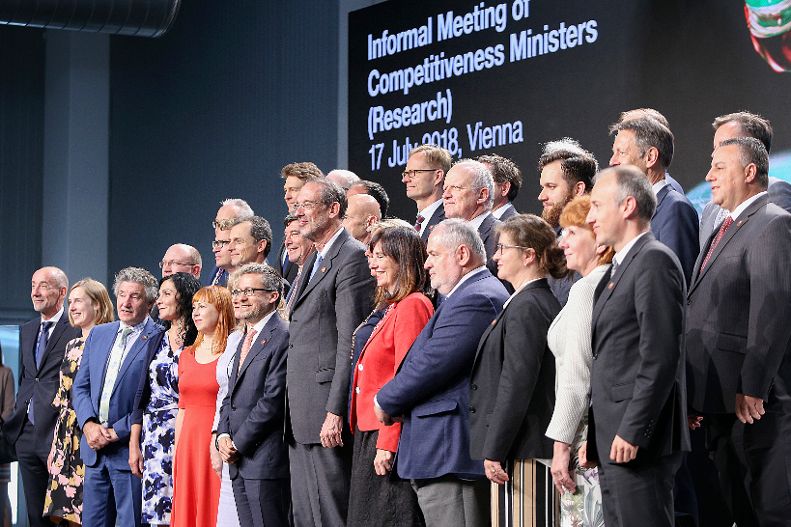
Informal meeting of research ministers in Vienna: Start of negotiations on the content of "Horizon Europe"
Vienna - Today ended the informal meeting of competitiveness ministers (Research) in Vienna. The ministers requested to be more involved in the planning of concrete implementation measures for Horizon Europe (EU programme for research and innovation). According to the ministers this is necessary as numerous Horizon Europe measures also have an impact on the research landscapes in the member states. The ministers agreed that cooperation is the key to improving Europe's role in research and innovation.
On the evening of 16 July 2018, the EU and EFTA countries' ministers responsible for research convened with Carlos Moedas, EU Commissioner for research, science and innovation. Heinz Faßmann, Austrian Federal Minister for Education, Science and Research, chaired the meeting. At the political level of this meeting, 20 delegations were represented. The presence of numerous ministers showed the importance of the meeting: it was the first time that the research ministers had come together since the proposal for Horizon Europe was submitted on 7 June 2018.
"I am pleased to see that, with the new Financial Framework, the European Commission puts a clear focus on research and innovation. Furthermore, the better use of synergies between individual programmes would be beneficial for research and innovation and the role they play”, Austrian Federal Minister Heinz Faßmann emphasised.
“Horizon Europe is the most ambitious funding programme for research and innovation proposed so far. A new aspect is that, in areas affecting our daily lives, new strategies should be pursued in order to deliver visible results more quickly. During our Presidency of the Council of the EU, we would like to advance the negotiations on Horizon Europe as much as possible,” the Austrian Federal Minister added.
Most delegations approved in principle of the idea of establishing research and innovation missions. A big majority was in favour of focussing on concrete results that visibly benefit the citizens, and choosing a broad and systemic approach for the selection of funding instruments and projects. Nevertheless, many ministers believed that the concept had not yet reached sufficient maturity. According to the delegations, too many questions regarding the selection and implementation of missions still need to be clarified. Now it is clearly up to the European Commission to submit relevant proposals.
A similar situation presents itself with respect to the European Innovation Council. There was broad support for the idea to better support ground breaking and transformative innovations. During the discussions of the details in Vienna, it transpired that there is still no consensus on the concrete forms the innovation funding should take under the future framework programme.
Ministers very clearly supported the continuation of the European Research Council for funding excellent basic research, as proposed by the European Commission. Measures for strengthening human resources in research, also known as Marie Skłodowska Curie Actions, also received widespread support. The question of a stronger budgetary weighting for both measures, as well as for research funding in favour of industry-related technologies, was raised.
Furthermore, delegations agreed that based on their experience with national reforms, an open, excellence-based and inclusive European Research Area should emerge. In this context, Poland and Sweden presented examples of successful reforms, implemented in higher education or with the “Open Innovation” model.
The decision-making processes (“governance”) for selecting concrete research issues and their implementation were also part of the discussion. These processes have changed considerably compared to previous EU framework programmes. They turned out to be one of the areas where delegations see the greatest need for improvement.
Background:
Horizon Europe
On 7 June 2018, the European Commission presented its proposal for the 9th Framework Programme for Research and Innovation of the EU. The programme is called “Horizon Europe” and covers the years 2021-2027. According to the Commission proposal, a total budget of 100 billion euros is foreseen (of which 2.4 billion euros are earmarked for the nuclear sector, and 3.5 billion euros for loan financing under the Invest EU Programme).
Official photos of this event will be published on the official Flickr channel.
More information about the event can be found on the event page.
Federal Ministry of Education, Science and Research
Spokesperson for the Federal Minister
Annette Weber
+43 1 53 120-50 25
+43 664 856 84 40
annette.weber@bmbwf.gv.at
Spokesperson for Coreper I at the Permanent Representation of Austria to the EU
Vera Pürerfellner
+32 2 23 45-370
+32 476 601 839
vera.puererfellner@bmeia.gv.at